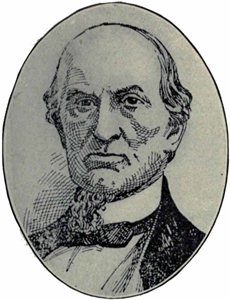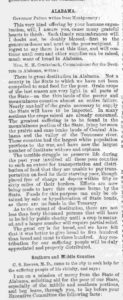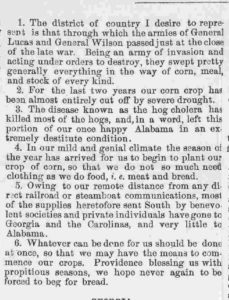On March 7, 1867 the Southern Famine Relief Commission published a fact sheet about the severe destitution in the South, especially in Alabama, Georgia, and the Carolinas. General O.O. Howard wrote that although his Freedmen’s Bureau was for the most part taking care of the basic needs of freedmen and loyal refugees, he did think that other Southerners were in extreme want, even widows and orphans in the planter class. The fact sheet printed information from first-hand accounts in the four states. The sheet closes by requesting donations to the organizations treasurer, who had already received $55,000 and purchased 50,000 bushels of corn. Since more was desperately needed, all churches were urged to take up collections on Sunday, March 17th.
Here’s the Alabama section of the report:
______________________________________________
According to the February 25, 1867 issue of The New-York Times the same U.S. Congress that had enacted legislation dividing the South into five military districts and requiring the passage of the would-be Fourteenth Amendment also provided a U.S. Navy ship for the Southern Famine Relief Commission to get food and supplies South:
Immediate Aid for the South.
The concurrent resolution that passed the Senate and House of Representatives, permitting the Secretary of the Navy to place a national vessel at the disposal of the Southern Famine Relief Commission, justifies the members of that Committee in making a personal and peremptory appeal for immediate relief. The vessel will be in readiness this week. Shall it be sent South with less than a full load, or shall it go burdened with material, tangible evidence of fraternal regard and sectional sympathy? Already large sums of money have been given for the relief of the poor and destitute of the South, but it is like a drop in the bucket. Vastly more is needed to make the aid effective, and now is the time to give it.
The Committee, through Mr. JAMES M. BROWN, of No. 61 Wall-street, will receive contributions of cash, provisions, clothing, boots and shoes – anything and everything that can suggest itself to men in behalf of other men in need – and faithfully apply whatever is sent.
In other days our people have generously sent aid to starving Ireland. They are now preparing to exhibit their sympathy with the struggling Cretan Christians by a practical demonstration; and no one supposes that they would decline to give of their bounty to anybody and everybody in any other country. Why, then, should this home charity, or rather this home duty, be comparatively unheeded? It would be wholly foreign to our habit, our thought, our honor, to permit a half-laden vessel to go from the land of plenty to the land of poverty, and we urgently second the appeal of the Commission that each and every citizen send at once his mite, or his fair proportion, in the furtherance of this cause, which is at once pleasurable and imperative.
The March 23, 1867 issue of Harper’s Weekly (page 179) exhorted readers to attend church on March 17th ready to contribute to help “our unfortunate brethren” and seemed to have a similar mindset to that of Congress:
While we oppose to the utmost the political policy which would intrust [sic] reconstruction exclusively to those who were lately in rebellion, and while the social condition of the Southern States undoubtedly demands the measures of the military bill, we do not in the least forget the sufferings of thousands and thousands of the people in those States, and we earnestly press upon the absolute necessity of immediate relief. The accounts from many parts of the South are most melancholy. …



